Behind a 'perfect' expat life, this British woman beats loneliness and anxiety with daily walks that grew into a movement
Amelia Bailey is one of many thousands of "expat wives" who call Singapore home. She tells CNA TODAY how her life as a trailing spouse unravelled and how walking every single day in clean and green Singapore saved her.
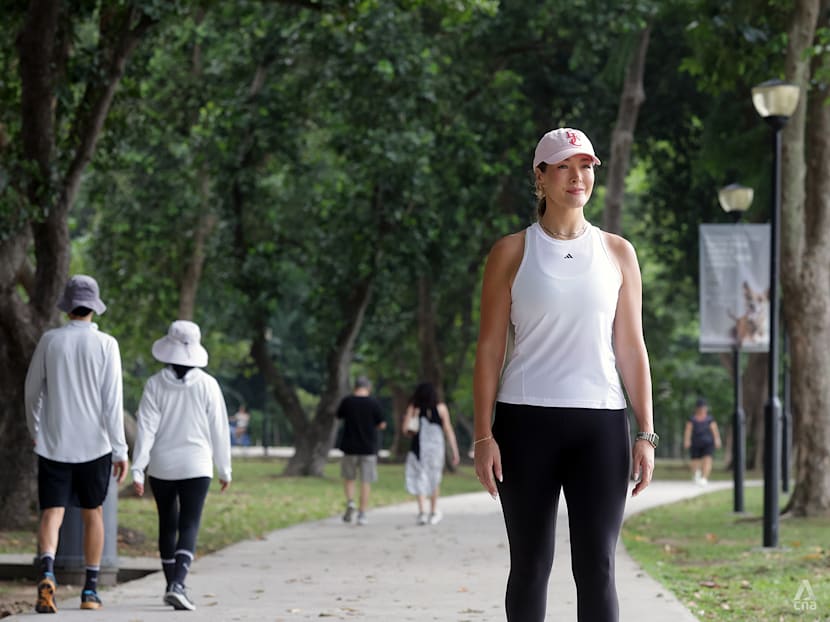
Ms Amelia Bailey after a walk at East Coast Park on Oct 28, 2025. (Photo: CNA/Ooi Boon Keong)

This audio is generated by an AI tool.
In this golden age of influencers, one can see why Amelia Bailey has more than 16,600 followers on Instagram.
She is a classic British beauty. Tall, with flawless skin, blue eyes and a toothpaste model smile. Slap on the label of "expat" – short for expatriate – and you complete the textbook image of a typical well-heeled foreigner.
The 39-year-old's Instagram page is full of perfectly lit shots of her grabbing a java at trendy cafes in Joo Chiat, walking along the beach at sunset and playing with her dog – a jet-black poodle every inch as photogenic as his owner.
And shots of walking - Ms Bailey is an avid walker, and I arranged to meet up with her at one of her favourite places to walk, East Coast Park, so we could talk, while walking of course.
Just from the superficial information I had about her, I must admit that I arrived at our interview with some preconceived notions about the person behind the pictures.
But upon meeting her – fittingly on World Mental Health Day on Oct 10 – it didn't take long for her to dismantle those preconceptions.
I was preemptively dreading the heat or the probable rain, given the recent spate of unpredictable weather. But it was mercifully pleasant at the park.
"One of the beauties of Singapore is that it facilitates an active lifestyle. It is very easy to get out and walk here," she said cheerfully.
"Even if it rains?" I ask, showing a typically Singaporean aversion to anything other than perfectly moderate weather.
"Oh, have you been in the London rain? It is never cold here!"
Remarkably, she has never missed a day of walking since she began in 2023. This small habit of putting on her shoes and getting out the door has changed her life completely.
"There’s no question that it has had the most transformative effect on my life. I started to notice a stabilisation of my mood and, in general, a more positive outlook, around the 20-day mark," she said.
But first, the backstory.
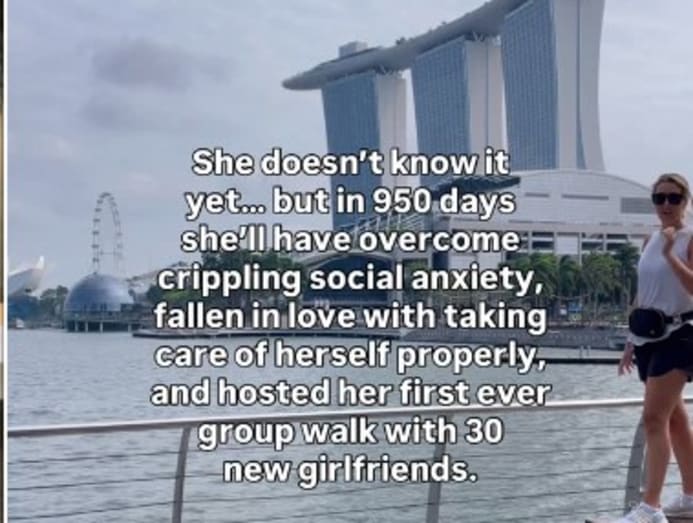
ROCK BOTTOM AGAIN ... AND AGAIN ... AND AGAIN
Born in Leeds, England, Ms Bailey said she had a normal British childhood as the eldest child of three.
But as she entered her teen years, her parents' marriage began falling apart – a slow disintegration that began affecting her mental health. It culminated in what she called her first "rock-bottom" moment when she was in university.
"My parents' divorce was extremely bitter. As the eldest daughter, I was listening to both, trying to make them feel better but just absorbing all that negative energy," she said.
Feeling overwhelmed, she saw the university doctor who put her on medication. But being medicated didn't make her feel better, so she eventually weaned herself off it.
During this time, Ms Bailey was working part-time at a golf course – which was also where she met her now-husband, Steve, now 45, who was then a professional golf coach.
They were dating for about two months when he got a job offer in South Korea. They continued their courtship long-distance and in 2009, about a year and a half later, once she was done with her studies, she moved to join him in South Korea. They got married and began their new life, far from home.
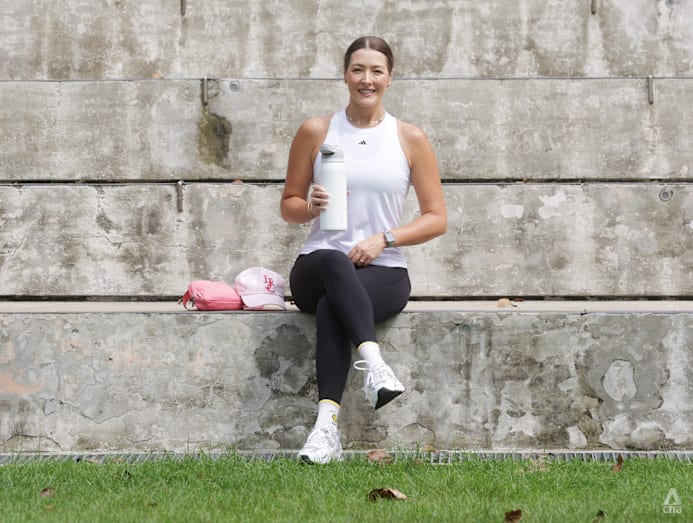
Then in 2013, another work move came for her husband – this time to Jakarta, Indonesia. Ms Bailey did not know it then, but this posting would be rock bottom number two for her.
"In hindsight, I was doing everything wrong," she said candidly.
"If you want to have a mental health issue, you do what I did. You don't go outside, you eat poorly, sleep really late, don't exercise."
She spent her days working exclusively from home as a magazine editor but found it hard to carve out proper breaks from work. Even when she did eke out spare pockets of time, Jakarta's dense city structure and notorious traffic jams kept her confined indoors a great deal.
Soon, she began to experience symptoms of extreme anxiety and stress.
"My mind was consumed by fear and anxiety constantly ... I was waking in the night with the night terrors," she recalled. She also started having gut problems – pains, chronic indigestion and more.
She made efforts to find out what was wrong, including seeing a roster of doctors and therapists. Despite this, things never seemed to get better.
Looking back, she realises that what she was doing for her mental health is akin to what yo-yo dieting does for weight loss.
"When I found myself at a really low point, I sought help and started to do the right things. And then as soon as I improved a little bit, I would just stop there," she said.
"Inevitably, it would come back again."
And then in 2018, her husband got another posting – this time to Singapore.
Upon moving here, Ms Bailey managed to find a job as a marketing director for a boutique firm. But before long, things begin unravelling again.
Soon, she found herself back in a familiar cycle: poor sleep, night terrors and gut problems began surfacing again. Rock bottom number three.
A GILDED CAGE
According to the Ministry of Manpower, as of 2024, more than 200,000 foreign employees hold an Employment Pass (EP) in Singapore.
Many of these EP holders have spouses who are given a Letter Of Consent (LOC) – which allows them to work without a separate pass but under strict conditions. (Ms Bailey is on an LOC but doesn’t work full time for an employer at present.)
I have observed that expats tend to run in completely separate social circles from locals like myself. Rarely do I turn up for a social gathering where someone familiar is an expat.
But speaking to Ms Bailey, I get an insight into what it is like to wear the shoe on the other foot – and it's not nearly as glamorous as it may appear from the outside.
"There's this idea that expats just show up and it's like you're on vacation with a beautiful, fabulous lifestyle," she said. "The reality is that everything changes when you move country."
Ms Bailey, who lives in a condominium at Joo Chiat, is clear that while her husband has been a staunch source of love and support for her, her experience of being an expat differs markedly from his due to her status as a trailing spouse.
"You're not just changing your job or your house or your neighbourhood. There's very little to anchor to, and especially for people who don't work, that lack of purpose and the loss of their connections is really disorienting."
She pointed out that as a born-and-raised citizen, I already have my core connections – people I went to school with, grew up with, lived with in the same communities. It is true that there are no new friendships in my already entrenched circles.
In her experience, penetrating established, tightly-knit local circles is much easier said than done. And this makes expats stay within their own communities.
The downside: The expat community is a largely transient one. Expats like herself may prove to be a comfort and support to others who come here to work but tend to move away after a few years.
"As an expat, if you can't return home for holidays – certainly Christmases and birthdays – that sense of isolation can be very strong," she said.
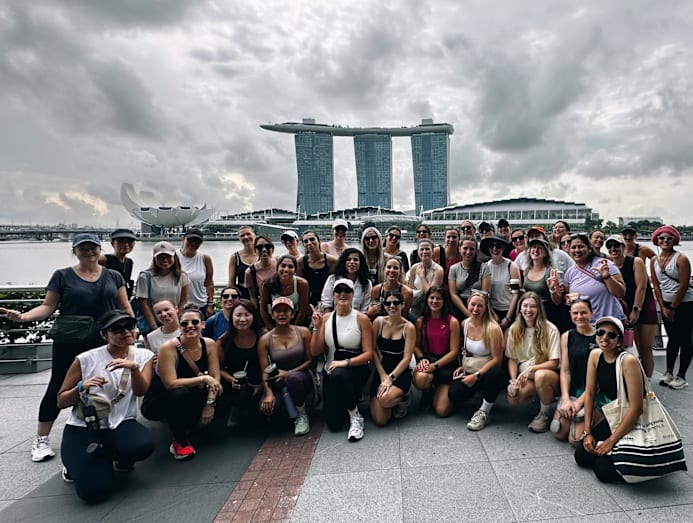
WALKING HER WAY TO WELLNESS
Despite the fresh start Singapore offered, the work stress began to build up slowly and she soon found her physical health caught in a now-familiar downward spiral.
She would break out in rashes and her digestive system was completely out of whack. Two endoscopies and two colonoscopies later, doctors could not diagnose anything conclusive.
Desperate and determined to break the cycle this time, she turned to an anxiety coach who told her to start moving every single day – even if just for a five- or 10-minute walk.
On her very first walk, she almost instantly felt better.
She started documenting her walks on her Instagram page, sharing openly about her physical and mental health struggles.
With that, the community she'd struggled to find for years started – slowly but surely – to find her instead.
"People started to cheer me on, sending me messages," she said. "It was so inspiring. So I named it #happygirlwalk."
Before long, she began to organise Happy Girl Walks for anyone keen to come along.
Her first event was capped at 30 walkers but many, many more signed up. Not wanting to disappoint anyone searching for the same sense of community, she put them on a wait list and started planning for future group walks.
On her 1,000th day of walking in early October, she organised a bigger walk – with 60 women. She also managed to raise S$3,000 for the Samaritans of Singapore from this walk.
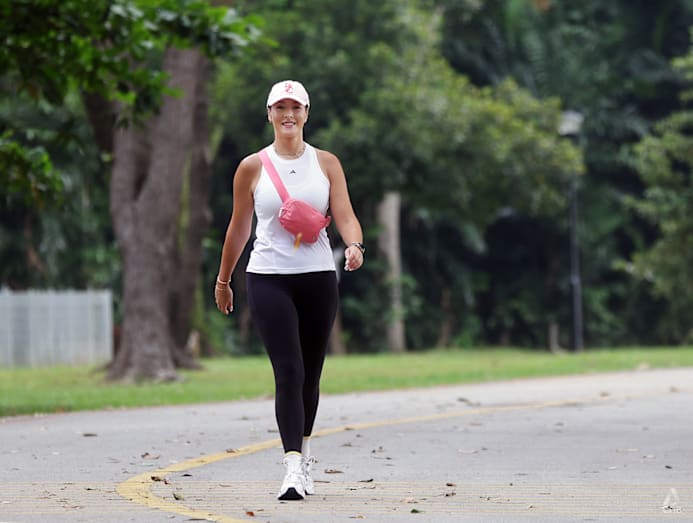
One of these women is Ms Pratiksha Kulkarni, 43, an interior designer has been in Singapore for 12 years with her husband who works here too.
Three years ago, Ms Kulkarni lost her job and found herself falling into depression.
"I was doomscrolling and watching Netflix to take my mind off my isolation. But the more I did that, the worse I felt. I did not step out of the house at all," said Ms Kulkarni who hails from India.
Then she stumbled upon one of Ms Bailey’s #happygirlwalk posts. Inspired, she began going on walks of her own, posting them on Instagram and tagging Ms Bailey. They got in touch and encouraged each other to keep going.
"I honestly don’t think I would have come out of that headspace (I was in) if I hadn't found Amelia," Ms Kulkarni said.
This community of women who walk their way to wellness is still new, but it is growing fast.
For Ms Bailey, the best part about these Happy Girl Walks is the way they draw in women from all nationalities and walks of life – almost like a mini-United Nations. She is particularly gratified to see Singaporean women becoming part of this movement too because the aim is, after all, to make deeper connections in Singapore.
"The biggest thing that the Happy Girl movement's given me is a real sense of purpose and meaning," she said.
"Every day, when I wake up, I feel really excited to share my walk – because I know that it is going to inspire someone today to go out and have a better day themselves."











